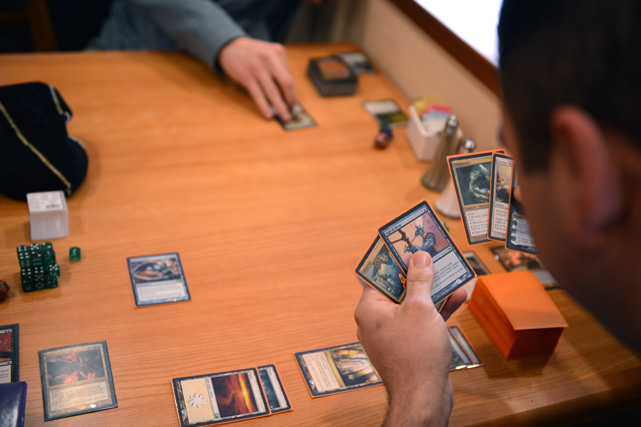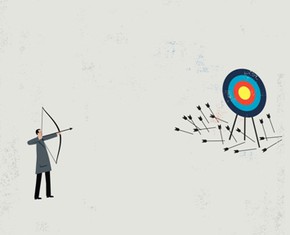The views expressed in our content reflect individual perspectives and do not represent the authoritative views of the Baha'i Faith.
Victories are won usually through a great deal of patience, planning and perseverance, and rarely accomplished at a single stroke. – Shoghi Effendi
During my school psychology internship, one of my first assignments involved a student who wouldn’t talk. My task comprised of weekly meetings with this student as part of my individual counseling experience.
This student (I’ll call him John), exhibited concerning characteristics per his high school teachers. These concerns included a lack of friends, an unusual fashion sense (he wore a trench coat over mostly black clothing), and he wouldn’t talk to (or look at) people, especially adults.
In our first session, we sat in the school’s conference room in the type of quiet where you could hear a pin drop to the carpeted floor. I tried friendliness, saying “hi,” and smiling encouragingly–all to no avail. After telling jokes, asking him about his interests, and periods of intense silence, there was still neither response nor eye contact.
For a couple of weeks I attempted all of the techniques I’d learned in graduate school, and they failed miserably. The bell would ring at the end of each session, and John would grab his books, head for class, and leave me questioning my career choice.
Determined I’d succeed and unwilling to admit defeat, I meditated on other options. When asking for assistance in dealing with life’s challenges, I often utilize one of my favorite prayers:
Is there any remover of difficulties save God? Say: Praised be God! He is God! All are His servants, and all abide by His bidding! – The Bab, Baha’i Prayers, p. 28.
After meditating on my predicament, I realized that creativity was the answer to my problem of earning John’s trust and getting him to open up. I sought the advice of the most creative person I know — my husband.
I asked, “do you have any ideas about how I can get a student to talk?”
He gave me a surprising suggestion: “play Magic with John.”
When my husband mentioned Magic, he didn’t mean the sort of tricks you’d see at a Criss Angel or David Copperfield show. He also wasn’t referring to the magic found in Harry Potter books and movies.
This kind of Magic was a trading card game, and as it turns out, it was very popular. As of 2011, almost twelve million players still played this card game. Each game entails a “battle” between “wizards” who employ a variety of artifacts, spells, and creatures to defeat their opponents.
My husband briefly described the game, and although I consider myself a tomboy with plenty of experience climbing trees and playing sports, I admitted a fantasy card game was outside my comfort zone. But I decided: I’ll give it a try — what do I have to lose?
So I bought a couple of decks of Magic cards. I brought two decks to school – one for John and one for me.
When he entered the room, I asked, “do you know how to play Magic?” For the first time, I saw his eyes, and they exhibited shock as well as interest.
He said his first word: “yeah.”
 Although not a loquacious response, that didn’t matter. I admitted to him that I was a novice, and he enthusiastically taught me. It turns out that the most magical thing wasn’t the game of Magic itself, but rather that playing the game revealed that John could talk, and he was not only articulate but also quite bright.
Although not a loquacious response, that didn’t matter. I admitted to him that I was a novice, and he enthusiastically taught me. It turns out that the most magical thing wasn’t the game of Magic itself, but rather that playing the game revealed that John could talk, and he was not only articulate but also quite bright.
After weeks of playing cards, I became better at Magic; John became more open and trusting. I caught a glimpse of the wonderful soul behind the silence and dark clothes.
This young man ultimately helped me become a better counselor. He taught me that I shouldn’t judge by appearances. Regardless of the trench coat and black clothing, he was a kind, sensitive young man. He’d had a difficult life, and his coping skills were merely different than others’ coping skills.
John also taught me that creativity was invaluable in working with students. Sometimes you have to go beyond what you learn in school and do something unusual, untested, and new.
Most importantly, I learned about patience and perseverance through challenges:
Perseverance is an essential condition. In every project firmness and steadfastness will undoubtedly lead to good results; otherwise, it will exist for some days, and then be discontinued. – Abdu’l-Baha, Selections from the Writings of Abdu’l-Baha, p. 320.
As this quote emphasizes, persevering is not only vital or necessary; it results in positive outcomes. With a little patience, perseverance, and creativity, I obtained a positive outcome. I succeeded in helping a student who needed an adult who cared enough not to give up on him.
















Comments
Sign in or create an account
Continue with Googleor